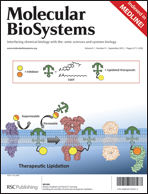The intrinsically disordered C-terminal region of Arabidopsis thaliana TCP8 transcription factor acts both as a transactivation and self-assembly domain†‡
Abstract
TCPs are plant specific transcription factors with non-canonical basic helix–loop–helix domains. While Arabidopsis thaliana has 24 TCPs involved in cell proliferation and differentiation, their mode of action has not been fully elucidated. Using bioinformatic tools, we demonstrate that TCP transcription factors belong to the intrinsically disordered proteins (IDP) family and that disorder is higher in class I TCPs than in class II TCPs. In particular, using bioinformatic and biochemical approaches, we have characterized TCP8, a class I TCP. TCP8 exhibits three intrinsically disordered regions (IDR) made of more than 50 consecutive residues, in which phosphorylable Ser residues are mainly clustered. Phosphorylation of Ser-211 that belongs to the central IDR was confirmed by mass spectrometry. Yeast two-hybrid assays also showed that the C-terminal IDR corresponds to a transactivation domain. Moreover, biochemical experiments demonstrated that TCP8 tends to oligomerize in dimers, trimers and higher-order multimers. Bimolecular fluorescence complementation (BiFC) experiments carried out on a truncated form of TCP8 lacking the C-terminal IDR indicated that it is effectively required for the pronounced self-assembly of TCP8. These data were reinforced by the prediction of a coiled coil domain in this IDR. The C-terminal IDR acts thus as an oligomerization domain and also a transactivation domain. Moreover, many Molecular Recognition Features (MoRFs) were predicted, indicating that TCP8 could interact with several partners to fulfill a fine regulation of transcription in response to various stimuli.


 Please wait while we load your content...
Please wait while we load your content...